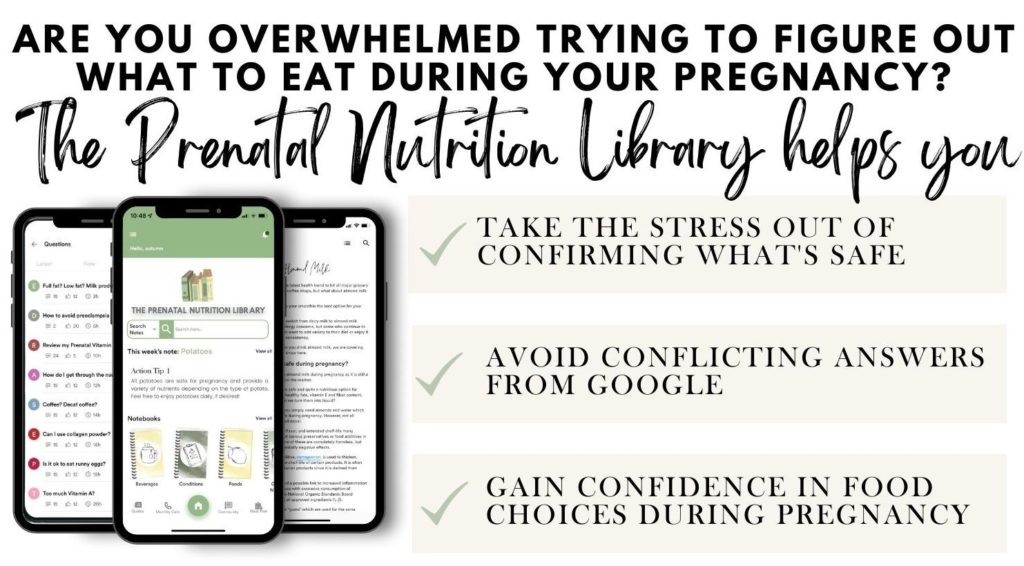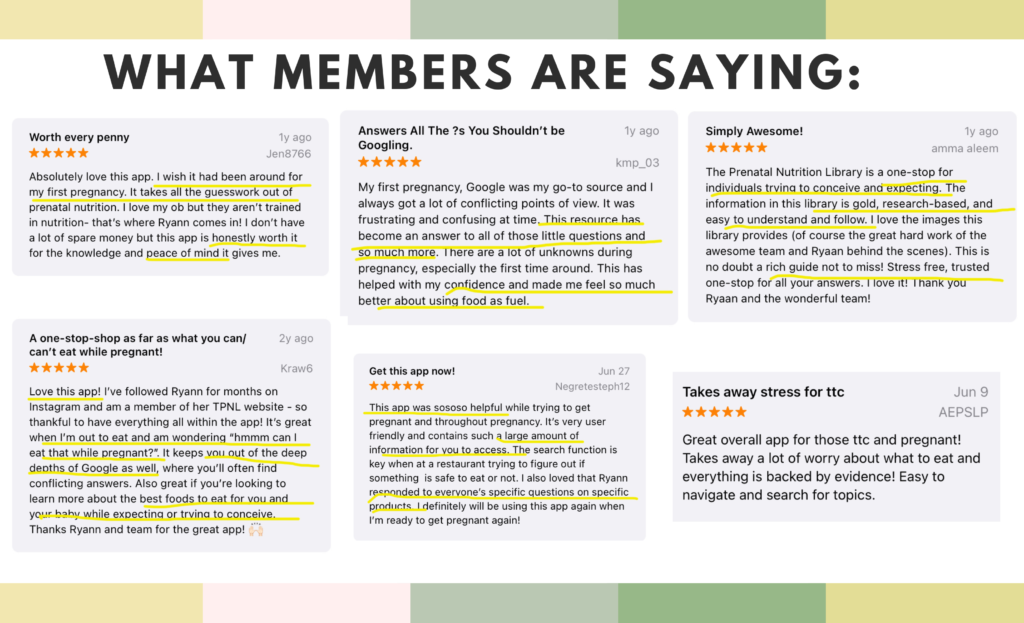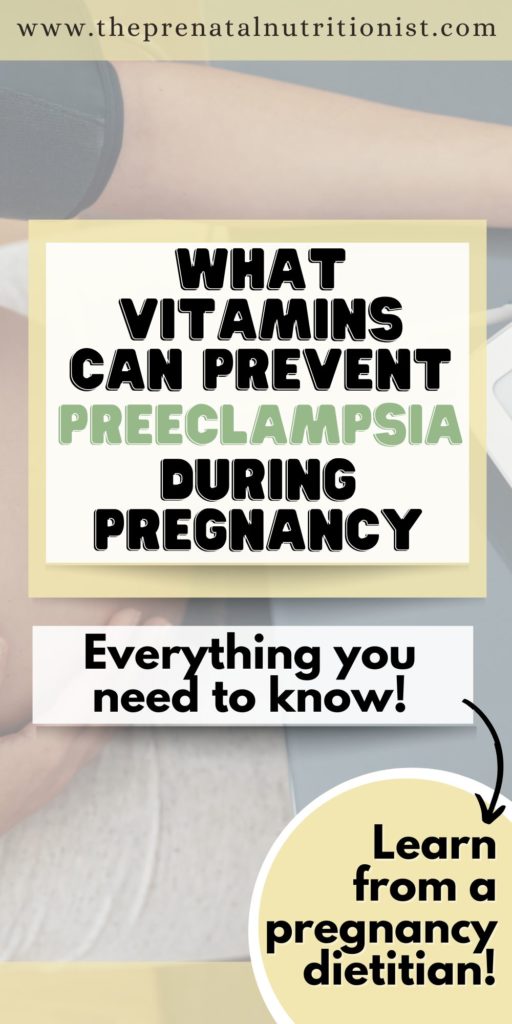
Becoming a mom is a journey like no other. There’s so much joy and a lot to navigate and be aware of. Two potential conditions that can develop during pregnancy are gestational hypertension (high blood pressure), or preeclampsia.
Preeclampsia is a pregnancy complication that affects up to 8% of pregnant women worldwide. It is defined as new onset high blood pressure accompanied by protein in the urine and, a lot of times, swelling during pregnancy. If uncontrolled or in severe cases, preeclampsia can lead to serious complications. These could range from headaches and swelling to premature birth in worst-case scenarios.
The good news is some risk factors within our control can help reduce the risk of preeclampsia. Yes, that’s right. Several studies have shown that certain vitamins and minerals could play a role in preventing and managing preeclampsia.
So, we’re glad you’re here. Pregnancy nutrition is something we know A LOT about here at The Prenatal Nutritionist and inside The Prenatal Nutrition Library!
That’s why today, I’ll provide details on these vitamins that could help reduce the risk of preeclampsia, but also keep in mind preeclampsia is a complex condition, and some factors are out of your control. This is a topic we need much more research on. Now, let’s dive in!
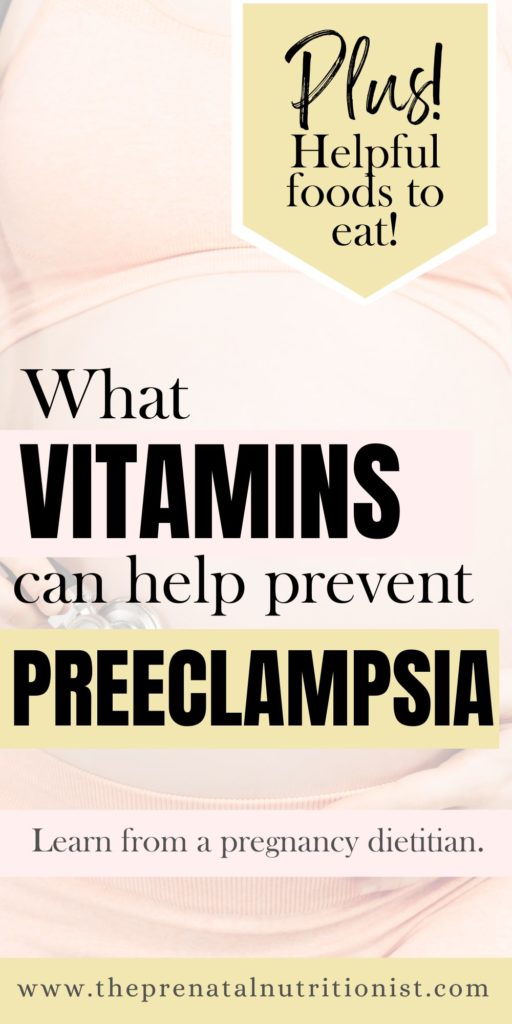
What Vitamins Help Prevent Preeclampsia?
As an expectant mom, making sure you and your baby are meeting nutrient needs and preventing deficiencies is a priority. Food first is what I always encourage. Supplements can be useful in some situations to help fill the gaps!
Your overall diet is most important. That said, some specific vitamins and minerals play a role in healthy blood pressure levels. Below are a few highlighted vitamins that may help reduce the risk of preeclampsia, but definitely not all of the nutrients involved in blood sugar regulation!
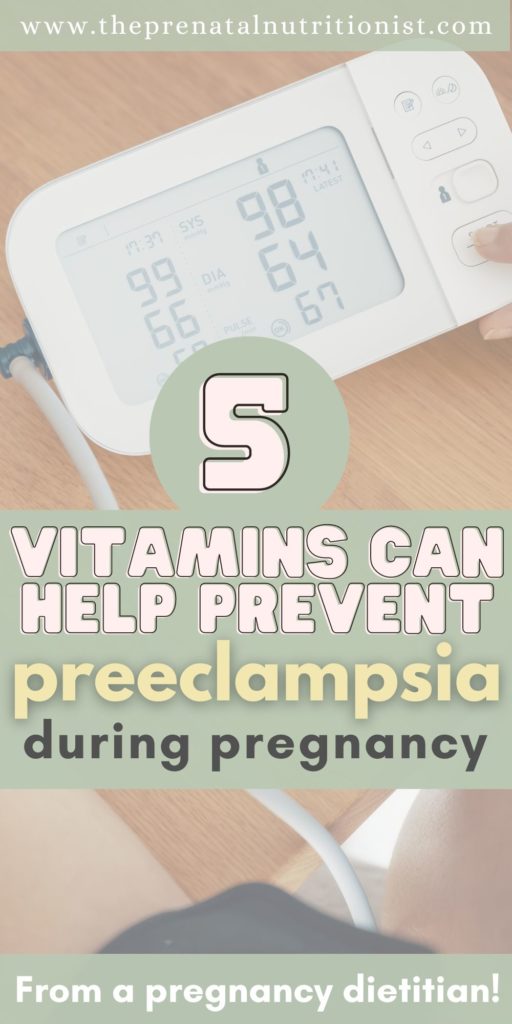
Vitamin D
They call it the “sunshine vitamin”. Vitamin D is involved in all sorts of important processes in our bodies, from supporting the absorption of calcium (or calcium supplements) and bone health to immune function and blood pressure regulation.
Studies have shown that pregnant women with vitamin D deficiency might actually be at an increased risk of developing preeclampsia. But on the flip side, if you can keep your vitamin D levels at an optimal level, it could actually help decrease that risk, which makes sense!
Vitamin D supplementation may play a role in preventing preeclampsia by influencing how the immune system works and how blood vessels function. Having optimal vitamin D levels may prevent inflammation, which is associated with the development of preeclampsia. Vitamin D also influences the renin-angiotensin system, which is key for regulating blood pressure. However, additional research is still needed to establish definitive recommendations.
How do you ensure you’re getting enough vitamin D?
Having your blood levels checked is the best way to know where you’re at and fine-tune supplementation for YOU. Getting some sunshine is always a great option. It’s found in limited supplies, but you can turn to fatty fish and eggs. And if those aren’t cutting it, ask your doctor or dietitian if a supplement might be the way to go.
Order an at-home vitamin D test here!
View this post on Instagram
Vitamin C
Vitamin C may help reduce the risk of preeclampsia through a few different pathways. First, it’s a strong antioxidant. Antioxidants neutralize free radicals and reduce oxidative stress, which is thought to be part of how preeclampsia gets its start. Then, you’ve got vitamin C’s special talent for revving up collagen production. Collagen, in turn, helps maintain nice, healthy blood vessels and vascular function.
That said, the jury’s still out on whether we can definitively say vitamin C is a preventer of preeclampsia. More studies need to be done to cement these findings. For now, some studies say there is a connection. We need more to confirm and repeat these findings.
The reality is that nutrition research, in general, is difficult because of factors like genetics, environment, and individual diet differences. Pregnancy adds an additional layer of difficulty to research. So, it’s tough to pinpoint how much weight vitamin C really pulls when it comes to preeclampsia prevention.
In the meantime, we know vitamin C foods have plenty of benefits for our body in general. Your best bet is to load your plate with plenty of vitamin C-rich foods such as citrus fruits, strawberries, bell peppers, and broccoli.
Vitamin E
Like vitamin C, vitamin E is adept at protecting our cells from oxidative damage. It functions partially as an antioxidant. But that’s just the tip of the iceberg for this vitamin. It’s also a key player in keeping our immune systems running smoothly, helping those blood vessels dilate properly, and keeping our cardiovascular health in tip-top shape.
Now, when it comes to vitamin E’s specific role in preventing preeclampsia, the details are still a little hazy. Some observational studies have found that vitamin E levels were low for those with preeclampsia. Others theorize supplementing with vitamin E could potentially offer some protection against preeclampsia, likely thanks to its antioxidant properties.
Here’s the theory: vitamin E’s antioxidant prowess may help shut down oxidative stress, which is thought to be one of the factors behind the development of hypertension and preeclampsia. Plus, vitamin E’s special ability to improve blood vessel dilation may help keep blood pressure levels nice and level during pregnancy.
We still need more research to determine the optimal vitamin E dosage and its effectiveness in keeping preeclampsia at bay. In the meantime, however, starting with food sources is a good idea. You can load up on vitamin E-rich foods like nuts, seeds, and leafy green vegetables.
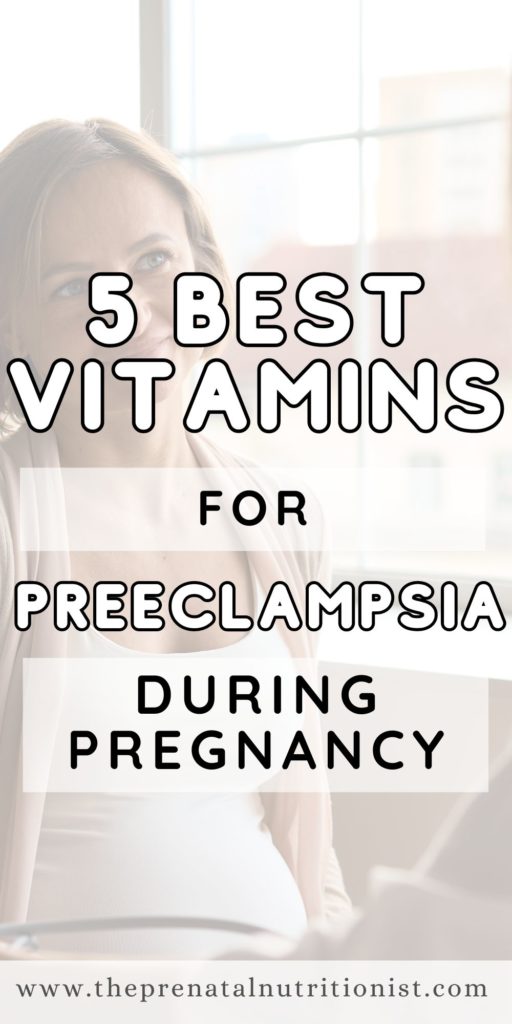
Vitamin A
Vitamin A is kind of a big deal when you’re pregnant; it’s a key player in keeping your immune system running strong and baby’s vision development. It also supports all that cell growth and differentiation that’s helping your little one grow and develop. So, it’s definitely an essential vitamin you want to have in your corner!
The research on whether vitamin A can help prevent preeclampsia has been mixed. Some studies suggest that being deficient in vitamin A could increase one’s risk of developing preeclampsia. However, vitamin A supplements (retinol) are not generally advised during pregnancy. More on vitamin A in this blog.
Either way, vitamin A’s potential preeclampsia-fighting powers are said to come from its antioxidant properties. Those antioxidant properties help neutralize oxidative stress and inflammation, which are thought to play a role in how preeclampsia develops. Vitamin A is also a bit of a vascular health promoter as it contributes to keeping those blood vessels functioning properly. This is super important for preventing hypertension, which is the hallmark of preeclampsia.
The best way to stock up on vitamin A during pregnancy is to add moderate amounts of liver to your diet (if you’re willing to try it!), carrots, sweet potatoes, meat, eggs, and spinach. But here’s the thing: you’ll want to steer clear of mega-dosing on vitamin A supplements, the retinol form. Too much can actually be harmful and may increase the risk of birth defects!
So, it’s all about finding the right balance here. Vitamin A is an essential and vital nutrient for pregnancy. However, it’s also possible to overdo it if you use supplements or eat a lot of liver and organ meat.
Prenatal Vitamins
Prenatal vitamins are (mostly) essential multivitamins designed to support the nutritional needs of pregnant individuals and promote a healthy pregnancy. While they are not a direct preventive measure for preeclampsia, their role in overall maternal health can indirectly reduce the risk of this pregnancy complication.
The American College of Obstetricians and Gynecologists (ACOG) has recommended all pregnant women take prenatal vitamins to fill nutritional gaps. What to look for in a prenatal vitamin includes nutrients like folate, magnesium, zinc, selenium, vitamin D, and others. A systematic review has revealed that folate may also play a role in reducing the risk of preeclampsia.
Supplementing with magnesium for preeclampsia prevention or management is also common since it has been shown to lower blood pressure. Also, low levels of calcium in pregnant women (which isn’t uncommon among women in the United States) are a risk factor for high blood pressure and, ultimately, preeclampsia. But that’s not all. Omega-3 fatty acids have anti-inflammatory properties and may help reduce the risk of preeclampsia by improving vascular function and lowering blood pressure.
Looking to find the best prenatal vitamin for you? Join The Prenatal Nutrition Library for our comprehensive expert guide to picking a prenatal vitamin. It includes specific recommendations detailing pros and cons, plus things like best for nausea, so you know what you take daily is safe and effective!
Other nutrients we haven’t mentioned yet that are important for high blood pressure include protein, potassium, choline, and glycine (like collagen)!
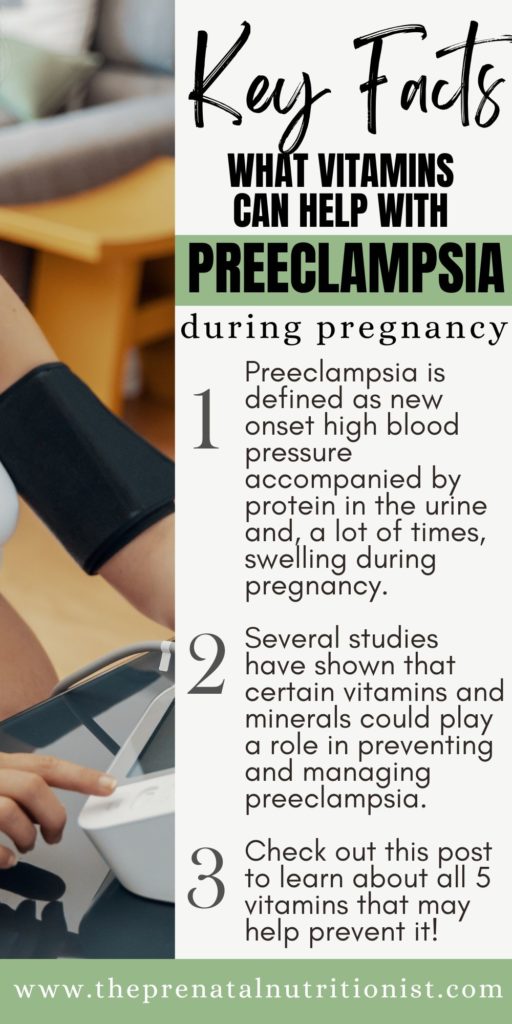
Pregnancy is a time when health and nutrition take center stage!
Preeclampsia is a serious condition in pregnancy. It’s very important for both mom and baby’s health that it is well-managed. While it’s true there is no way to eliminate your risk for preeclampsia completely, nutrition is one factor you CAN control. Nutrition plays a big role in blood pressure regulation and management during and outside pregnancy. Working to increase the vitamins mentioned above is a great start in the right direction! We can also implement other lifestyle strategies not mentioned here to help reduce the risk of preeclampsia, such as physical activity.
Food first is always the best approach. This means be sure to incorporate plenty of food sources of these vitamins before thinking about supplementation. When considering supplements during pregnancy, working closely with your healthcare team and dietitian is important. Your supplement needs depend on your unique situation!
If you’re ready to learn more about these nutrients and nutrition for high blood pressure, The Prenatal Nutrition Library (TPNL) has got your back. Our nutrition experts have crafted evidence-based resources to guide you through a healthy pregnancy. Our sole mission is to equip you with the knowledge and resources to make informed decisions about your diet during pregnancy. Find our more comprehensive guide on gestational hypertension and preeclampsia inside TPNL, too!
Speaking of resources, you’ve got to check out our Free One-Week Sample Meal Plan! It’s been meticulously crafted to give you a taste of just how satisfying and nourishing eating during pregnancy can be. A balanced, well-rounded diet is key!



